by Clayton Walnum

If you put a bunch of progressive rock lovers into a room and asked them to vote for their all-time favorite classic prog group, I suspect that Genesis would win handily. A perfect example of this popularity is the fact that no other group has so strongly influenced the so-called neo-prog bands of the 80s and 90s. When it was time for prog to make a comeback, it was mostly Genesis to which the new young musicians turned. Would there even be a Marillion, Pendragon, IQ, Citizen Cane, Jadis, Magellan, Glass Hammer, Cairo, Crucible, Like Wendy, Flamborough Head, Sylvan, or Metaphor (to name only a few) if there had never been a Genesis? No way!
Another case in point is one of my favorite prog Web sites, Gnosis (located at gnosis2000.net). On this great site, nearly 50 reviewers listen to and rate progressive music releases. The scores are all averaged to provide what has to be one of the most authoritative prog listings in existence. If you rank all the groups by score, you'll discover that Genesis has three albums in the top 20. When you consider that Gnosis lists over 13,000 albums, that's quite an achievement.
Still, some of these albums are over 30 years old. You folks who are new to progressive rock may not be familiar with all the classics in the genre. As for the more experienced prog listeners, maybe you've missed a Genesis album or three, or maybe, like me, you just love to read about this stuff. In any case, here begins my overview of one of the most significant groups in prog history. I'll be presenting this omnibus review in three segments. This, the first, concentrates on the years when Peter Gabriel was Genesis's vocalist. The second part will cover the progressive years with Phil Collins at the helm, and finally, part 3 will examine the band's output when they turned to more commercial fare.
From Genesis To Revelation (1969)
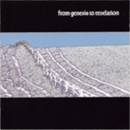 Genesis crashed upon the world with this, their first album. Maybe "crashed" is a bit of an overstatement. Actually, it's an immense overstatement. The truth is that this album went mostly ignored when it was released, only selling in any quantity years later, after Genesis gained its fame. The music here is barely recognizable as Genesis. The album is strongly song oriented, and while some interesting instrumentation pops up here and there, these songs are very much an extension of 60s-era British pop. The one link to later Genesis is the fact that this is a concept album.
Genesis crashed upon the world with this, their first album. Maybe "crashed" is a bit of an overstatement. Actually, it's an immense overstatement. The truth is that this album went mostly ignored when it was released, only selling in any quantity years later, after Genesis gained its fame. The music here is barely recognizable as Genesis. The album is strongly song oriented, and while some interesting instrumentation pops up here and there, these songs are very much an extension of 60s-era British pop. The one link to later Genesis is the fact that this is a concept album.
On this disc, not only has the band itself not found its identity, but also the performances show a group of youngsters groping for their way. A good example of this is Gabriel's vocals. Gabriel probably has one of the most distinctive voices in prog rock. However, here you'd barely recognize him. He sings most songs here matter-of-factly, his performance lacking the intensity and texture for which he would become famous. Also notable is the fact that Steve Hackett and Phil Collins do not appear in this lineup. [Chris Stewart and John Silver played drums -ed.]
In short, this album is recommended to completists only or to those curious about Genesis's origin. By the way, this album has been released over the years with various covers. The one shown here is from the recent 2-CD collector's edition. The original cover is all black with just the album's title printed in the upper left corner. [Also note that the same material was also released as Where The Sour Turns To Sweet - ed.]
Trespass (1970)
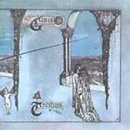 The difference between From Genesis to Revelation and Genesis's second album, Trespass, is astonishing. In a single year, Genesis took a huge leap toward the band that would make prog history. The pop sounds are now completely gone, replaced with much more complex arrangements, placing the band squarely in the center of the 1970's burgeoning prog-rock category. In fact, the melodies and arrangements here act as an introduction to the style further developed by the classic Genesis line up that would appear on their next album, Nursery Cryme.
The difference between From Genesis to Revelation and Genesis's second album, Trespass, is astonishing. In a single year, Genesis took a huge leap toward the band that would make prog history. The pop sounds are now completely gone, replaced with much more complex arrangements, placing the band squarely in the center of the 1970's burgeoning prog-rock category. In fact, the melodies and arrangements here act as an introduction to the style further developed by the classic Genesis line up that would appear on their next album, Nursery Cryme.
The performances here are confident, inventive, and marked with more virtuosity than their previous effort. Also, Gabriel's voice has taken on an expressiveness almost completely lacking in his debut performance the year before. From the first word sung on this album, there's no doubt you're listening to Peter Gabriel. Amazingly, the line up here is the same as the group that performed From Genesis to Revelation, though you'd be hard pressed to tell by the more advanced sound. If there's a downside, the recording quality isn't top notch, although still good enough to stay out of the way of the music. Still, there are a couple of moments of distortion that always make me cringe a bit.
Of special note here is the song "The Knife," which would become a Genesis concert staple for years to come. The opening track. "Looking For Someone," is also an album highlight, featuring the kind of songwriting that would become Genesis's style for many future albums. While not as complex and mystical as what was to come, Trespass is a marvelous example of the early Genesis sound and a classic progressive-rock release.
Nursery Cryme (1971)
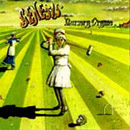 In 1971, it all came together for Genesis, at least as far as their sound was concerned. No doubt the addition of guitarist Steve Hackett and drummer Phil Collins had a lot to do with the transformation, as Nursery Cryme represents the first appearance of the classic Genesis lineup. Unfortunately, in spite of the fact that they were a cutting-edge prog group, Genesis still weren't getting the attention they deserved, though their following was growing. Still, this was the year when people stood up and took notice of this new type of music coming out of England. Things were looking up. Specifically, this was the year Yes released their breakthrough effort, The Yes Album, and a little group known as Emerson, Lake and Palmer released their astonishing Tarkus. So Genesis had good company -- company whose successes would help propel Genesis into the forefront of prog.
In 1971, it all came together for Genesis, at least as far as their sound was concerned. No doubt the addition of guitarist Steve Hackett and drummer Phil Collins had a lot to do with the transformation, as Nursery Cryme represents the first appearance of the classic Genesis lineup. Unfortunately, in spite of the fact that they were a cutting-edge prog group, Genesis still weren't getting the attention they deserved, though their following was growing. Still, this was the year when people stood up and took notice of this new type of music coming out of England. Things were looking up. Specifically, this was the year Yes released their breakthrough effort, The Yes Album, and a little group known as Emerson, Lake and Palmer released their astonishing Tarkus. So Genesis had good company -- company whose successes would help propel Genesis into the forefront of prog.
I have a special fondness for Nursey Cryme, as it was my introduction to Genesis. In fact, this era of music was huge for me, because it was around this time that I also discovered Yes, EL&P, Gentle Giant, and King Crimson, groups that are musical staples for me to this day. As one might guess from the album's title, Nursery Cryme is a dark and mysterious outing. The compositions here grow from the group's interest in mythical tales, a focus that would remain all through the years Gabriel stayed on as vocalist -- and even beyond. The grim cover, with Squash players using severed heads as balls, match the dark dreams presented within.
The album begins with the beautiful, yet eerily melancholy, melodies of "The Musical Box," a Genesis classic and concert favorite. About three and a half minutes into the song, the full band bursts forth, and the world gets its first taste of Steve Hackett's unique electric-guitar style and soaring, regal, fuzz-toned melodies. Also included here is the spectacular "The Fountain of Salmacis," a composition that foreshadows the sophisticated "Supper's Ready," an opus that would appear on the next album.
I still can't listen to this album without goose bumps crawling all over me. Throughout the dark tales here -- including stories of a monstrous hogweed, a suicidal bloke named Harold, and a doomed hunter and the mythological source of hermaphrodites -- Genesis springs back and forth between gentle melodies and roaring symphonic brilliance, all marked by Gabriel's gruff vocal stylings and the complex interplay between guitarist Hackett and keyboard player Tony Banks. And oh those wondrous mellotron washes! As theatrical as it is musical, Nursery Cryme presented to the world the classic Genesis lineup of Peter Gabriel, Phil Collins, Michael Rutherford, Steve Hackett, and Tony Banks. Damn, there's those goose bumps again.
Foxtrot (1972)
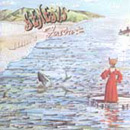 In many ways, Genesis's fourth album, Foxtrot, is Nursery Cryme, Volume 2. Both albums just seem to fit together, almost as if they were recorded at the same time or were intended to be released as a double album. In fact, if you look at the artwork on the back of Foxtrot, you can see, in the upper right corner, the Squash players from the Nursery Cryme art, still knocking around those severed heads. The opening mellotron chords of this album's first track, "Watcher Of The Skies," are a Genesis trademark if there ever was one, a musical passage that any progressive-rock aficionado can identify in seconds.
In many ways, Genesis's fourth album, Foxtrot, is Nursery Cryme, Volume 2. Both albums just seem to fit together, almost as if they were recorded at the same time or were intended to be released as a double album. In fact, if you look at the artwork on the back of Foxtrot, you can see, in the upper right corner, the Squash players from the Nursery Cryme art, still knocking around those severed heads. The opening mellotron chords of this album's first track, "Watcher Of The Skies," are a Genesis trademark if there ever was one, a musical passage that any progressive-rock aficionado can identify in seconds.
Foxtrot also contains the first Genesis opus, "Supper's Ready," a 23-minute tour-de-force of mythical tales and outstanding musicianship. The driving meter of the subtrack "Apocalypse In 9/8" is one of my all-time favorite Genesis passages and acts as the bridge to the track's amazing climax. "Supper's Ready" would remain in Genesis's concert set list for many years to come, even after Gabriel left the group and Collins took over the vocal chores. Audiences would have it no other way.
The line up here is still, of course, the classic group of Peter Gabriel, Phil Collins, Michael Rutherford, Steve Hackett, and Tony Banks. In fact, this lineup would remain intact all the way through the next three albums, over which time the group would record some of the finest progressive rock of all time. If I had to choose between Nursey Cryme and Foxtrot, I'd probably go with Foxtrot, due mostly to "Supper's Ready." Anyway, how can you not be entranced by song titles such as "The Guaranteed Eternal Sanctuary Man," "Ikhnaton And Itsacon And Their Band Of Merry Men," and "Sure As Eggs Is Eggs (Aching Men's Feet)"? Thank heavens, though, I don't have to choose.
Live (1973)
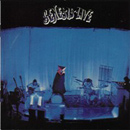 After hearing both Nursery Cryme and Foxtrot, I became a Genesis fanatic. I must have listened to those two albums a hundred times each, always discovering something new buried within the complex tracks. I despaired, though, of ever being able to see the band perform live. This wasn't, after all, mainstream stuff, and the band's following was small. Around this time, I was working for a record distributor, and my boss, knowing that I was a huge Genesis fan, told me that he could get me tickets for a Genesis appearance in New York City. Even though attending this show required a three-hour train ride, I jumped at the chance. My girlfriend (now my wife of 28 years) and I set off for the Big City.
After hearing both Nursery Cryme and Foxtrot, I became a Genesis fanatic. I must have listened to those two albums a hundred times each, always discovering something new buried within the complex tracks. I despaired, though, of ever being able to see the band perform live. This wasn't, after all, mainstream stuff, and the band's following was small. Around this time, I was working for a record distributor, and my boss, knowing that I was a huge Genesis fan, told me that he could get me tickets for a Genesis appearance in New York City. Even though attending this show required a three-hour train ride, I jumped at the chance. My girlfriend (now my wife of 28 years) and I set off for the Big City.
I mention all this personal history because I can't look at the cover of Genesis's first live album without feeling intense nostalgia. You see, the stage setup depicted on the cover of this album is exactly the one Genesis used that day in New York. The stage setup was Spartan yet elegant, with Genesis performing in front of a plain white sheet that hid all the amplifiers. This was Genesis at a point where the great Phil Collins was playing on a tiny drum kit boasting one small kick drum and only three toms! Peter Gabriel stood behind his own kick drum (weird), wearing his now famous masks, including the foxhead, the bat wings, and the "musical box," depicted on this album's cover.
Seeing Genesis like this was a rare and intimate treat, and it would never happen again; this group of talented Englishmen was close to hitting the big time. In any case, this live album is a terrific document of an early Genesis performance. Featured here are "Watcher Of The Skies," "Get 'Em Out By Friday," "The Return Of The Giant Hogweed," "The Musical Box," and "The Knife." The recording quality is exceptional for its time, and the performances are wonderful. This is Genesis stripped down to its raw musical power, without tons of overdubs and without the truckloads of sophisticated electronics that would soon become part of the show.
Selling England By The Pound (1973)
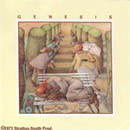 Most prog experts agree that Selling England By The Pound is Genesis' greatest achievement. Everything that Genesis had set out to do gelled perfectly here, giving the world one of the best progressive-rock albums that would ever be recorded. You couldn't improve one note of this masterpiece -- and it would be sacrilege to try! From the opening a cappella vocals of "Dancing With The Moonlit Knight" to the closing strains of "The Cinema Show - Aisle Of Plenty," this album is perfect and magnificent.
Most prog experts agree that Selling England By The Pound is Genesis' greatest achievement. Everything that Genesis had set out to do gelled perfectly here, giving the world one of the best progressive-rock albums that would ever be recorded. You couldn't improve one note of this masterpiece -- and it would be sacrilege to try! From the opening a cappella vocals of "Dancing With The Moonlit Knight" to the closing strains of "The Cinema Show - Aisle Of Plenty," this album is perfect and magnificent.
Included here is the FM-radio hit "I Know What I Like (In Your Wardrobe)" (back in the 70s, there was a huge difference between FM and AM radio; these days, just about everything is FM), as well as the intensely powerful "Firth Of Fifth," one of my all-time favorite Genesis tracks. The fifth track, "The Battle Of Epping Forest," a tale of warring gangs, is probably the song that sounds most like the Genesis that recorded Nursery Cryme and Foxtrot, while most of the other tracks present a band that has polished their playing and composing chops to peak form. Not that "Epping Forest" isn't up to par; it just has more of that older Genesis sound than the other tracks here.
Another one of my favorites on this album is "The Cinema Show - Aisle Of Plenty," which not only boasts some great melodies, but also features an extended instrumental section that truly rocks. Here a complex rhythm background provides the engine for Tony Banks, who demonstrates why he's one of prog's premiere keyboardists. Soaring synth lines float over the driving rhythm section, augmented by occasional mellotron washes. Every time I hear this section of the album, I want to go back to the beginning of the track for another listen. If you can afford only one Genesis album, this is it.
The Lamb Lies Down On Broadway (1974)
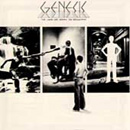 By the time The Lamb Lies Down On Broadway was released, rumors of Genesis' demise were rampant. I remember listening to this album, feeling as if a best friend had just died. Genesis had become one of the greatest groups in the world (at least as far as I was concerned), and the thought that this would be their last album was heartbreaking. As it turned out, the rumors were exaggerated, as no one from the band had said anything about breaking up. Instead, they had simply announced the departure of Peter Gabriel. Simply? As far as Genesis fans were concerned, a Genesis without Peter Gabriel couldn't survive. Who on earth could replace Genesis's strange, flamboyant, yet brilliant frontman?
By the time The Lamb Lies Down On Broadway was released, rumors of Genesis' demise were rampant. I remember listening to this album, feeling as if a best friend had just died. Genesis had become one of the greatest groups in the world (at least as far as I was concerned), and the thought that this would be their last album was heartbreaking. As it turned out, the rumors were exaggerated, as no one from the band had said anything about breaking up. Instead, they had simply announced the departure of Peter Gabriel. Simply? As far as Genesis fans were concerned, a Genesis without Peter Gabriel couldn't survive. Who on earth could replace Genesis's strange, flamboyant, yet brilliant frontman?
Although The Lamb Lies Down On Broadway is, by every measure, a great album, it was actually a bit of a side step for the band. Peter Gabriel had come up with a bizarre story of a young man named Rael, who gets caught up in some sort of energy vortex and is transported to a nightmarish underground world where snake women consume human flesh and mad doctors remove male genitalia in order to cure disease. Gabriel's detailed story was as sprawling as it was strange. The band decided that it would take a double album to do the story justice. With all this space, Genesis tried some new things, experimenting with some atmospheric, nearly avant-garde, interludes.
The first half of The Lamb Lies Down On Broadway is a solid prog effort that offers many classic Genesis moments, especially the songs "The Lamb Lies Down On Broadway," "Fly On A Windshield," "In The Cage," "Back In N.Y.C.," and "The Carpet Crawlers." However, by the second half of the story, the band seems to run out of steam. There are a few high points, including "The Lamia" and "The Colony Of Slippermen," but for the most part, much of this part of the album is uninspired and unexciting. Had it been condensed to a single album, The Lamb Lies Down On Broadway could have been as great as its predecessor, Selling England by the Pound. Still, one must keep in mind that even a flawed Genesis album is miles above 99% of the other stuff out there.
Tricks Of The Tale, Part 2 | Tricks Of The Tale, Part 3
Links: www.genesis-music.com
Copyright © by ProgressiveWorld.net All Right Reserved.
Published on: 2002-01-26 (3816 reads)

